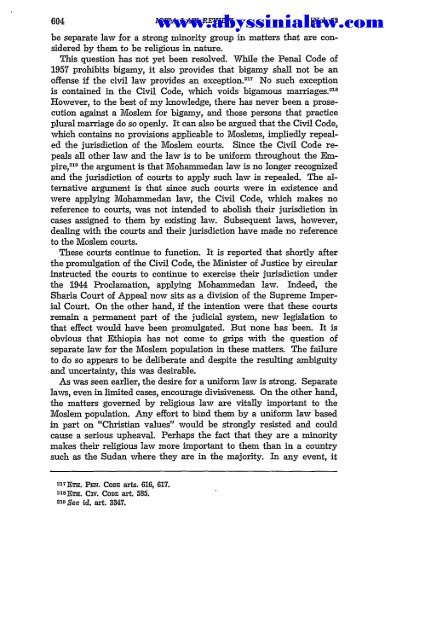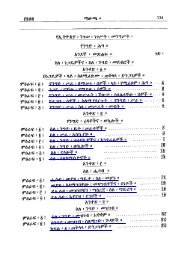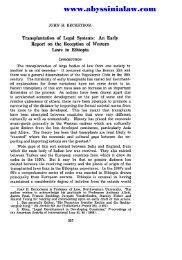You also want an ePaper? Increase the reach of your titles
YUMPU automatically turns print PDFs into web optimized ePapers that Google loves.
IOWA LAW REVIEW<br />
be separate law for a strong minority group in matters that are considered<br />
by them to be religious in nature.<br />
This question has not yet been resolved. While the Penal Code of<br />
1957 prohibits bigamy, it also provides that bigamy shall not be an<br />
offense if the civil law provides an exception. 17 No such exception<br />
is contained in the Civil Code, which voids bigamous marriages. 218<br />
However, to the best of my knowledge, there has never been a prosecution<br />
against a Moslem for bigamy, and those persons that practice<br />
plural marriage do so openly. It can also be argued that the Civil Code,<br />
which contains no provisions applicable to Moslems, inpliedly repealed<br />
the jurisdiction of the Moslem courts. Since the Civil Code repeals<br />
all other law and the law is to be uniform throughout the Empire,<br />
21 [VOL. 53<br />
www.abyssinialaw.com<br />
0 the argument is that Mohammedan law is no longer recognized<br />
and the jurisdiction of courts to apply such law is repealed. The alternative<br />
argument is that since such courts were in existence and<br />
were applying Mohammedan law, the Civil Code, which makes no<br />
reference to courts, was not intended to abolish their jurisdiction in<br />
cases assigned to them by existing law. Subsequent laws, however,<br />
dealing with the courts and their jurisdiction have made no reference<br />
to the Moslem courts.<br />
These courts continue to function. It is reported that shortly after<br />
the promulgation of the Civil Code, the Minister of Justice by circular<br />
instructed the courts to continue to exercise their jurisdiction under<br />
the 1944 Proclamation, applying Mohammedan law. Indeed, the<br />
Sharia Court of Appeal now sits as a division of the Supreme Imperial<br />
Court. On the other hand, if the intention were that these courts<br />
remain a permanent part of the judicial system, new legislation to<br />
that effect would have been promulgated. But none has been. It is<br />
obvious that Ethiopia has not come to grips with the question of<br />
separate law for the Moslem population in these matters. The failure<br />
to do so appears to be deliberate and despite the resulting ambiguity<br />
and uncertainty, this was desirable.<br />
As was seen earlier, the desire for a uniform law is strong. Separate<br />
laws, even in limited cases, encourage divisiveness. On the other hand,<br />
the matters governed by religious law are vitally important to the<br />
Moslem population. Any effort to bind them by a uniform law based<br />
in part on "Christian values" would be strongly resisted and could<br />
cause a serious upheaval. Perhaps the fact that they are a minority<br />
makes their religious law more important to them than in a country<br />
such as the Sudan where they are in the majority. In any event, it<br />
217 ETH. PEN. CODE arts. 616, 617.<br />
2 1 SETH. CirV. CODE art. 585.<br />
210 See id. art. 3347.





